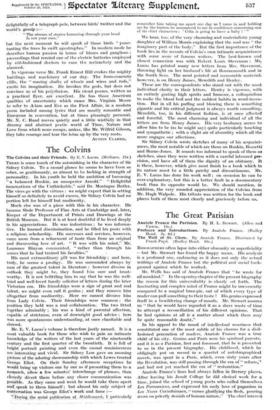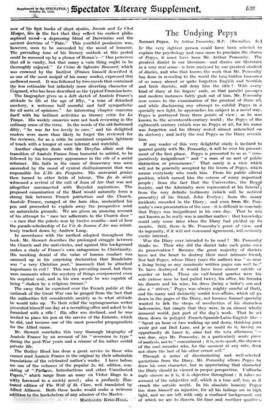The Great Parisian
Anatole France the Parisian. Unwin. 1 6s.)
Prefaces and Introductions. Head. 2s. 6d.)
The Well of St. Clare. By Frank Pare. (Bodley Head.
Anatole France. Illustrated by 16s.) BIOGRAPHERS often lapse into either obscurity or superficiality —but Mr. Stewart has found the happy mean. His analysis is a profound one, embracing as it does not only the actual
writings of Anatole France but the political and social back- ground against which he worked.
Mr. Wells has said of Anatole France that " he wrote for all mankind." In the opening chapter of the present biography the reason for this universitality is clearly set forth. The fascinating and complex mind of France might be irreverently compared to a magical bran-pie, out of which every type of reader can pull something to their taste I His genius expressed
itself in a bewildering change of moods. Mr. Stewart assures us " that he would have regarded it as a sheer waste of time to attempt a reconciliation of his different opinions. That he had opinions at all is a matter about which there may be quite reasonable doubt."
In his appeal to the mood of intellectual weariness that constituted one of the most subtle of his charms for a disil- lusioned generation of readers, Anatole France was a true child of his city. Genius and Paris were his spiritual parents, and it is as a Parisian, first and foremost, that he is presented to us in the present biography. His childhood, which he
obligingly put on record in a quartet of autobiographical novels, was spent in a Paris, which, even sixty years after the Revolution, was still passing through the era of " reform," and had not yet reached the era of " restoration."
Anatole France's lines had always fallen in literary places. After leaving his Jesuit College he did clerical work for a time, joined the school of young poets who called themselves Les Parnassiens, and expressed his early love of paganism in. Les Noces Corinthiennes, verses glorifying the flesh, pouring Scorn on priestly denials of human nature." The chief interest,
now of his first books of short stories, Jimmie and Le Chat Maigre,fies Fla the fact that thei reflect his earliest plulo, sophical mood—a depressing blend of Darwinism and the ancient doctrine of " Fate." This youthful pessimism was, however, soon to be succeeded by the mood of humour. The prevailing tone of his literary outlook at this period could be summed up by a phrase of Renan's—" One perceives that all is vanity, but that many a vain thing ought to be thoroughly enjoyed." Le Crime de Sylvestre Bonnard, which was crowned by the Institut (France himself described it as one of the most insipid of his many works), expressed this mellowed mood. It was followed by two novels that contained the less estimable- but infinitely more diverting character of do' ignard, who has been described as the typical Francian hero.
The biographer gives us a deft sketch of Anatole France's attitude to life at the age of fifty, " a tone of detached mockery, a welcome half scornful and half sympathetic for all sorts of opinions." - An interesting 'Chapter concerns itself with his brilliant activities as literary critic for Le Temps. His weekly causeries were not book reviewing in the ordinary sense of the term. In the words of the old-fashioned ditty, " he was far too lovely to care," and his delighted readers were more than likely to forget the reviewed for the reviewer, for as a critic he combined exquisite lightness of touch with a temper at once tolerant and watchful..
Another chapter deals with the Dreyfus affair and the transition of Anatole France from humorist to satirist, to be followed by his temporary appearance in the ?rife of a social reformer. His faith in the cause of democracy was soon succeeded by the mood of cynical disillusionment that was responsible for L'Ile des Penguins. His mercurial genius then turned to other fields of labour. The fin de sieele witnessed a revival of the cult of Joan of Arc that was not altogether unconnected with Royalist aspirations. The proposed canonization of the Maid would naturally form a strong link between French patriotism and the Church. Anatole France, enraged at the bare idea, unsheathed his pen and proceeded to explain away the prospective saint on naturalistic grounds. We are given an amusing account of his attempt to " race her adherents to the Church door " —a race that the priests won by twelve months—and of how the pseudo-scholarship of La Vie de Jeanne_ d'Arc was relent- lessly tracked down by Andrew Lang.
In accordance with the method adopted throughout the
book, Mr. Stewart describes the prolonged struggle between the Church and the anti-clerics, and against this background makes a study of France's own antagonism to Christianity. His mocking denial of the value of human conduct was summed up in his surprising declaration that Baudelaire was " a very- Christian poet," insomuch that he attached importance to evil ! This was his prevailing mood, but there were moments when the mystery of things overpowered even his sceptical soul, and in his own words he was capable of being " shaken by a religious tremor."
The sway that he exercised over the French public at the outbreak of the Great War can be gauged from the fact that the authorities felt considerable anxiety as to what attitude he would take up. To their relief the septuagenarian writer presented himself one day at a recruiting office and asked to be furnished with a rifle ! His offer was declined, and he was invited to place his pen at the service of the Entente, which he did, and became one of the most powerful propagandists for the Allied cause.
Mr. Stewart concludes this very thorough biography of Anatole France by an account of his " reversion to type " during the post-War years and a resume of his rather sordid private life.
The Godley Head has done a great service to those who cannot read Anatole France in the original by their admirable translations of the celebrated author's works. I have before me one of the volumes of the popular 2s. 6d. edition, con- sisting of " Prefaces, Introductions and other Uncollected Papers," which range from an essay on Victor Hugo to a witty foreword to a society novel ; also a profusely illus- trated edition of The Well of St. Clare, well translated by Alfred Allinson. Both these books would make a welcome addition to the bookshelves of any admirer of the Master.
MAGEPALEN KING-HALL.































































 Previous page
Previous page